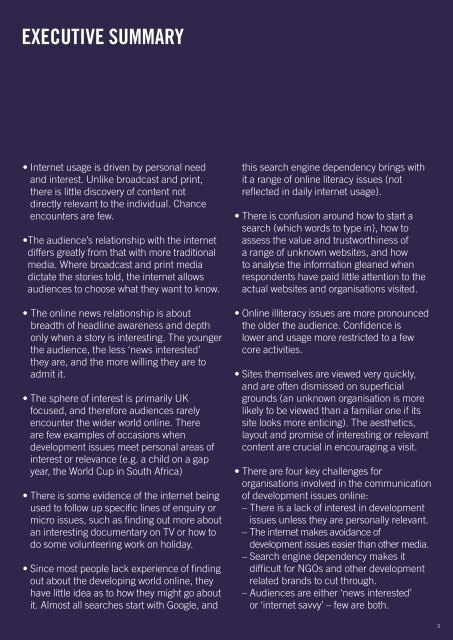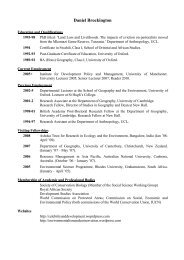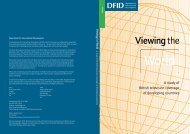The World Online How UK citizens use the internet to find out about ...
The World Online How UK citizens use the internet to find out about ...
The World Online How UK citizens use the internet to find out about ...
- No tags were found...
You also want an ePaper? Increase the reach of your titles
YUMPU automatically turns print PDFs into web optimized ePapers that Google loves.
executive summary• Internet usage is driven by personal needand interest. Unlike broadcast and print,<strong>the</strong>re is little discovery of content notdirectly relevant <strong>to</strong> <strong>the</strong> individual. Chanceencounters are few.•<strong>The</strong> audience’s relationship with <strong>the</strong> <strong>internet</strong>differs greatly from that with more traditionalmedia. Where broadcast and print mediadictate <strong>the</strong> s<strong>to</strong>ries <strong>to</strong>ld, <strong>the</strong> <strong>internet</strong> allowsaudiences <strong>to</strong> choose what <strong>the</strong>y want <strong>to</strong> know.• <strong>The</strong> online news relationship is ab<strong>out</strong>breadth of headline awareness and depthonly when a s<strong>to</strong>ry is interesting. <strong>The</strong> younger<strong>the</strong> audience, <strong>the</strong> less ‘news interested’<strong>the</strong>y are, and <strong>the</strong> more willing <strong>the</strong>y are <strong>to</strong>admit it.• <strong>The</strong> sphere of interest is primarily <strong>UK</strong>foc<strong>use</strong>d, and <strong>the</strong>refore audiences rarelyencounter <strong>the</strong> wider world online. <strong>The</strong>reare few examples of occasions whendevelopment issues meet personal areas ofinterest or relevance (e.g. a child on a gapyear, <strong>the</strong> <strong>World</strong> Cup in S<strong>out</strong>h Africa)• <strong>The</strong>re is some evidence of <strong>the</strong> <strong>internet</strong> being<strong>use</strong>d <strong>to</strong> follow up specific lines of enquiry ormicro issues, such as <strong>find</strong>ing <strong>out</strong> more ab<strong>out</strong>an interesting documentary on TV or how <strong>to</strong>do some volunteering work on holiday.• Since most people lack experience of <strong>find</strong>ing<strong>out</strong> ab<strong>out</strong> <strong>the</strong> developing world online, <strong>the</strong>yhave little idea as <strong>to</strong> how <strong>the</strong>y might go ab<strong>out</strong>it. Almost all searches start with Google, andthis search engine dependency brings withit a range of online literacy issues (notreflected in daily <strong>internet</strong> usage).• <strong>The</strong>re is confusion around how <strong>to</strong> start asearch (which words <strong>to</strong> type in), how <strong>to</strong>assess <strong>the</strong> value and trustworthiness ofa range of unknown websites, and how<strong>to</strong> analyse <strong>the</strong> information gleaned whenrespondents have paid little attention <strong>to</strong> <strong>the</strong>actual websites and organisations visited.• <strong>Online</strong> illiteracy issues are more pronounced<strong>the</strong> older <strong>the</strong> audience. Confidence islower and usage more restricted <strong>to</strong> a fewcore activities.• Sites <strong>the</strong>mselves are viewed very quickly,and are often dismissed on superficialgrounds (an unknown organisation is morelikely <strong>to</strong> be viewed than a familiar one if itssite looks more enticing). <strong>The</strong> aes<strong>the</strong>tics,lay<strong>out</strong> and promise of interesting or relevantcontent are crucial in encouraging a visit.• <strong>The</strong>re are four key challenges fororganisations involved in <strong>the</strong> communicationof development issues online:– <strong>The</strong>re is a lack of interest in developmentissues unless <strong>the</strong>y are personally relevant.– <strong>The</strong> <strong>internet</strong> makes avoidance ofdevelopment issues easier than o<strong>the</strong>r media.– Search engine dependency makes itdifficult for NGOs and o<strong>the</strong>r developmentrelated brands <strong>to</strong> cut through.– Audiences are ei<strong>the</strong>r ‘news interested’or ‘<strong>internet</strong> savvy’ – few are both.Title of chapter/subchapter 3





